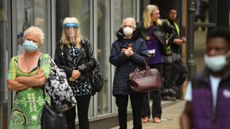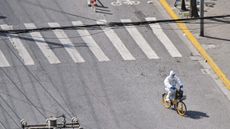The impact of coronavirus on the world - region by region
Rapid spread of infection is striking fear into governments and populations


As new cases of coronavirus outside China exceed those within, countries around the world are preparing for when - not if - it takes hold among their populations.
The disease that originated in Wuhan, in China’s Hubei province, has now spread to 48 countries and territories, killing at least 2,804 people globally, 2,747 of whom were from mainland China. The number of recorded worldwide cases now stands at 82,183.
In the UK, 35 schools have shut and hundreds of office workers have been affected by office closures. Keen to keep the economy ticking, the government has warned against “overreaction”. Matt Hancock, the health secretary, announced the government is planning to launch a mass public information campaign, but that it was important to keep the reaction “proportionate”.
Subscribe to The Week
Escape your echo chamber. Get the facts behind the news, plus analysis from multiple perspectives.

Sign up for The Week's Free Newsletters
From our morning news briefing to a weekly Good News Newsletter, get the best of The Week delivered directly to your inbox.
From our morning news briefing to a weekly Good News Newsletter, get the best of The Week delivered directly to your inbox.
US officials also warned on Wednesday that reports that Covid-19 had been generated in a laboratory as a biological weapon were part of a Russian disinformation campaign, while the World Health Organization (WHO) cautioned against the use of the term “pandemic”. The word will only be appropriate, said officials, when the disease can no longer be contained.
The only continent yet to be touched by the outbreak is Antarctica.
Europe
Italy became the first European country to experience a sizeable Covid-19 outbreak, and in less than a week its known cases have risen from three to 470, making it the third worst-affected country in the world, after China and South Korea.
While the cases in France are much lower, at 18, two people have now died. And on Wednesday, Germany’s health minister Jens Spahn said that the country was “at the beginning of a coronavirus epidemic”, ordering pandemic plans into action. A few cases have now been reported in Greece, Switzerland, Belgium, Sweden, North Macedonia, Croatia, Norway, Finland and Austria.
In Tenerife, 1,000 hotel guests - including 168 britons - are under quarantine, despite warnings that this could allow the disease to spread unsafely among guests. The Telegraph reports that “Spanish health authorities said they had no idea how many cases they were facing.”
The Middle East
Iran has long been a junction linking Europe and Asia, and business travellers go frequently to and from China, one of the few countries that will trade with it in defiance of US sanctions.
The country’s health ministry has officially recorded 139 infections and 19 deaths - the highest number of fatalities outside China. This would mean a mortality rate of around 13%, which is far above the rate seen anywhere else, leading many to think the real number of infected may be much higher than officially reported.
On Tuesday, the Iranian deputy health minister Iraj Harirchi was diagnosed with Covid-19 after downplaying his visible sickness at a news conference.
Iran’s border with Iraq is long and porous and, while its health system is large and sophisticated, Iraq’s is the opposite. This is the case with a number of the region’s poorer nations. There are concerns that, not only will infections be going unreported, but that when the disease spreads, treatment quality in many countries will be poor.
“Can you believe Afghanistan, Iraq and Pakistan have lower casualties than Iran? It is impossible,” one Iranian official told the Financial Times. “Our neighbours either have business reasons not to disclose their deaths like Turkey and UAE [United Arab Emirates], or do not have the laboratory capability to detect the virus.”
Iraq banned its citizens from travelling to nine countries on Wednesday, including China, Iran, South Korea and Italy.
The UAE, whose airport in Dubai is the world’s busiest in terms of international traffic, cancelled all flights to and from Iran on Tuesday. On Wednesday, the government said it had taken measures to prepare for “worst case scenarios”.
North America
The Trump administration has come under fire for its evisceration - through defunding and firings - of government agencies designed to cope with pandemics, while the president himself, who yesterday announced his vice president Mike Pence would lead the efforts to counter the outbreak, has been accused of understating the risk.
Late on Wednesday, the Centers for Disease Control and Prevention (CDC) said that a person from California had “contracted the coronavirus without traveling outside the United States or coming in contact with another patient known to have the infection”, reports The Washington Post. This is “the first sign that the disease may be spreading within a local community”, says the newspaper.
The total number of cases in the US has reached 60. Dr. Nancy Messonnier, the director of the CDC’s National Center for Immunization and Respiratory Diseases, said: “Ultimately we expect we will see community spread in this country. It’s not so much a question of if this will happen anymore, but rather more a question of exactly when this will happen and how many people in this country will have severe illness.”
In Canada, where 12 cases have been recorded, health minister Patty Hajdu encouraged Canadians to stockpile food and medication in their homes. “It’s good to be prepared because things can change quickly,” she said.
–––––––––––––––––––––––––––––––For a round-up of the most important stories from around the world - and a concise, refreshing and balanced take on the week’s news agenda - try The Week magazine. Get your first six issues free–––––––––––––––––––––––––––––––
South America
The only reported case of the new coronavirus in Latin America was announced yesterday in Brazil, where a 61-year-old man from Sao Paulo, who recently returned from a business trip to Italy, has been diagnosed.
“Officials were scrambling on Wednesday to track down the other passengers on the flight the man took to Brazil and to find others who had contact with him in recent days,” The New York Times reports. “The infection news broke in the midst of Brazil’s Carnival celebrations, popular with foreign visitors.”
Asia
East Asia remains the epicentre of the outbreak, even though infection rates in China have slowed, and the country is tentatively beginning to return to normal. Yesterday, 52 deaths were reported in China, the lowest number in three weeks.
There still remains, however, deep distrust of the authorities when it comes to transparency, and while there seems to be signs of improvement, the outbreak is far from over.
“South Korea currently has the largest outbreak outside mainland China,” says CNN. At least 1,595 people have been infected, including the first US soldier, and 13 have died. Nearly two dozen members of South Korea’s military were announced to have been infected on Wednesday.
In Japan, 189 people have Covid-19, and new reports have emerged of a woman being infected for the second time. The country now faces an anxious wait as it struggles to contain the virus ahead of the 2020 Summer Olympics. A further 705 cases were recorded on the Diamond Princess ship, quarantined close to Japan.
–––––––––––––––––––––––––––––––For a round-up of the most important stories from around the world - and a concise, refreshing and balanced take on the week’s news agenda - try The Week magazine. Start your trial subscription today –––––––––––––––––––––––––––––––
Africa
Egypt confirmed the first case of Covid-19 in Africa on Valentine’s Day and Algeria has announced one case, but there is skepticism that this is truly the full extent of the infections, as well as concerns about the continent’s vulnerability in the event of a serious outbreak.
“It is highly likely that the under-resourced and unprepared national health systems of Africa cannot detect its presence,” says U.S. News. “And its impact there could be especially devastating.”
Australasia
There have been 23 cases detected in Australia, and none in New Zealand, with no deaths reported in either. Both are maintaining a travel ban on visitors from the Chinese mainland.
The worldwide figures
| Country | Cases | Deaths | Recovered |
| China | 78,499 | 2,747 | 32,580 |
| S. Korea | 1,595 | 13 | 24 |
| Italy | 470 | 12 | 3 |
| Japan | 189 | 3 | 32 |
| Iran | 139 | 19 | 25 |
| Singapore | 93 | Row 6 - Cell 2 | 62 |
| Hong Kong | 89 | 2 | 18 |
| USA | 60 | Row 8 - Cell 2 | 6 |
| Thailand | 40 | Row 9 - Cell 2 | 22 |
| Bahrain | 33 | Row 10 - Cell 2 | Row 10 - Cell 3 |
| Taiwan | 32 | 1 | 5 |
| Germany | 27 | Row 12 - Cell 2 | 15 |
| Kuwait | 26 | Row 13 - Cell 2 | Row 13 - Cell 3 |
| Australia | 23 | Row 14 - Cell 2 | 15 |
| Malaysia | 22 | Row 15 - Cell 2 | 20 |
| France | 18 | 2 | 11 |
| Vietnam | 16 | Row 17 - Cell 2 | 16 |
| Spain | 13 | Row 18 - Cell 2 | 2 |
| U.K. | 13 | Row 19 - Cell 2 | 8 |
| U.A.E. | 13 | Row 20 - Cell 2 | 3 |
| Canada | 12 | Row 21 - Cell 2 | 3 |
| Macao | 10 | Row 22 - Cell 2 | 6 |
| Iraq | 5 | Row 23 - Cell 2 | Row 23 - Cell 3 |
| Oman | 4 | Row 24 - Cell 2 | Row 24 - Cell 3 |
| Philippines | 3 | 1 | 2 |
| Croatia | 3 | Row 26 - Cell 2 | Row 26 - Cell 3 |
| India | 3 | Row 27 - Cell 2 | 3 |
| Austria | 2 | Row 28 - Cell 2 | Row 28 - Cell 3 |
| Finland | 2 | Row 29 - Cell 2 | 1 |
| Israel | 2 | Row 30 - Cell 2 | Row 30 - Cell 3 |
| Lebanon | 2 | Row 31 - Cell 2 | Row 31 - Cell 3 |
| Pakistan | 2 | Row 32 - Cell 2 | Row 32 - Cell 3 |
| Russia | 2 | Row 33 - Cell 2 | 2 |
| Sweden | 2 | Row 34 - Cell 2 | Row 34 - Cell 3 |
| Afghanistan | 1 | Row 35 - Cell 2 | Row 35 - Cell 3 |
| Algeria | 1 | Row 36 - Cell 2 | Row 36 - Cell 3 |
| Belgium | 1 | Row 37 - Cell 2 | 1 |
| Brazil | 1 | Row 38 - Cell 2 | Row 38 - Cell 3 |
| Cambodia | 1 | Row 39 - Cell 2 | 1 |
| Egypt | 1 | Row 40 - Cell 2 | 1 |
| Georgia | 1 | Row 41 - Cell 2 | Row 41 - Cell 3 |
| Greece | 1 | Row 42 - Cell 2 | Row 42 - Cell 3 |
| North Macedonia | 1 | Row 43 - Cell 2 | Row 43 - Cell 3 |
| Nepal | 1 | Row 44 - Cell 2 | 1 |
| Norway | 1 | Row 45 - Cell 2 | Row 45 - Cell 3 |
| Romania | 1 | Row 46 - Cell 2 | Row 46 - Cell 3 |
| Sri Lanka | 1 | Row 47 - Cell 2 | 1 |
| Switzerland | 1 | Row 48 - Cell 2 | Row 48 - Cell 3 |
Create an account with the same email registered to your subscription to unlock access.
Sign up for Today's Best Articles in your inbox
A free daily email with the biggest news stories of the day – and the best features from TheWeek.com
William Gritten is a London-born, New York-based strategist and writer focusing on politics and international affairs.
-
 Covid-19: what to know about UK's new Juno and Pirola variants
Covid-19: what to know about UK's new Juno and Pirola variantsin depth Rapidly spreading new JN.1 strain is 'yet another reminder that the pandemic is far from over'
By Arion McNicoll, The Week UK Published
-
 Vallance diaries: Boris Johnson 'bamboozled' by Covid science
Vallance diaries: Boris Johnson 'bamboozled' by Covid scienceSpeed Read Then PM struggled to get his head around key terms and stats, chief scientific advisor claims
By The Week UK Published
-
 Good health news: seven surprising medical discoveries made in 2023
Good health news: seven surprising medical discoveries made in 2023In Depth A fingerprint test for cancer, a menopause patch and the shocking impacts of body odour are just a few of the developments made this year
By The Week Staff Published
-
 How serious a threat is new Omicron Covid variant XBB.1.5?
How serious a threat is new Omicron Covid variant XBB.1.5?feature The so-called Kraken strain can bind more tightly to ‘the doors the virus uses to enter our cells’
By Chas Newkey-Burden Published
-
 Will new Covid testing rules for China prevent the spread of new variants?
Will new Covid testing rules for China prevent the spread of new variants?Today's Big Question Curbs on travellers from China are being introduced worldwide in a bid to stop the emergence of new coronavirus strains
By Arion McNicoll Published
-
 Will new ‘bivalent booster’ head off a winter Covid wave?
Will new ‘bivalent booster’ head off a winter Covid wave?Today's Big Question The jab combines the original form of the Covid vaccine with a version tailored for Omicron
By The Week Staff Published
-
 Can North Korea control a major Covid outbreak?
Can North Korea control a major Covid outbreak?feature Notoriously secretive state ‘on verge of catastrophe’
By The Week Staff Last updated
-
 The outlook for China’s zero-Covid strategy
The outlook for China’s zero-Covid strategyfeature WHO chief slams Beijing’s plan to eliminate virus as experts warn of 1.5m deaths
By The Week Staff Published


